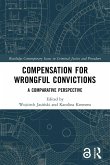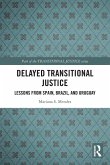Plea bargaining is one of the most important and most discussed issues in modern criminal procedure law. Based on historical and comparative legal research, the author has analysed the wide-spread use of plea bargaining in different criminal justice systems. The book sets out in-depth studies of consensual case dispositions in the UK, examining how plea bargaining has developed and spread in England and Wales. It also goes on to discusses in detail the problems that this practise poses for the rule of law by avoiding procedural safe-guards. The book draws on empirical research in its examination of the absence of informal settlements in the former GDR, offering a unique insight into criminal procedure in a socialist legal system that has been little studied. Drawing on her research findings, the author goes on to discuss the extent to which plea bargaining should be developed in the International Criminal Court in The Hague, as the question of this practise is set to be one of the seminal debates in the development of international criminal procedures in the new International Criminal Court. Plea Bargaining in National and International Law will be of particular interest to academics and students of international criminal law, criminal procedures and comparative law.
This book analyses plea bargain in different families of law, and drawing on these findings asks to what extent this practice should be developed in international criminal law. The book sets out in-depth studies of consensual case dispositions in the UK, setting out how plea bargaining has developed and spread in England and Wales. It discusses in detail the problems that this practice poses for the rule of law as well as well as the principles of adversarial litigation. The book considers plea-bargaining in the USA as well as in the civil law German justice system. The book also draws on empirical research looking at the absence of informal settlements in the former GDR, offering a unique insight into criminal procedure in a socialist legal system that has been little studied. The book then goes on to look at international criminal law and examine the use of informal negotiations in the International Criminal Tribunal for former Yugoslavia and the International Criminal Tribunal for Rwanda and the possible use in future cases of the International Criminal Court.
This book analyses plea bargain in different families of law, and drawing on these findings asks to what extent this practice should be developed in international criminal law. The book sets out in-depth studies of consensual case dispositions in the UK, setting out how plea bargaining has developed and spread in England and Wales. It discusses in detail the problems that this practice poses for the rule of law as well as well as the principles of adversarial litigation. The book considers plea-bargaining in the USA as well as in the civil law German justice system. The book also draws on empirical research looking at the absence of informal settlements in the former GDR, offering a unique insight into criminal procedure in a socialist legal system that has been little studied. The book then goes on to look at international criminal law and examine the use of informal negotiations in the International Criminal Tribunal for former Yugoslavia and the International Criminal Tribunal for Rwanda and the possible use in future cases of the International Criminal Court.








